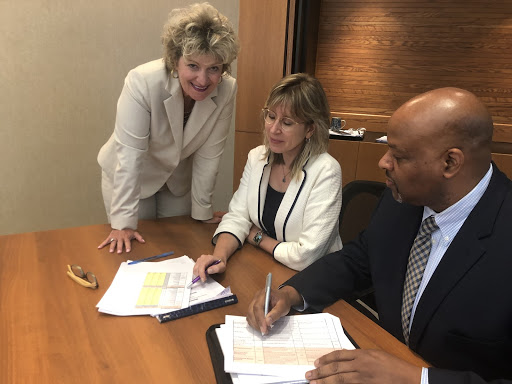A typical week for me before COVID was 60 hours – in the office by 7am so I could get actual work done before the busy day started – and was filled with internal meetings, external meetings, conference calls and pop-in conversations. There was always travel involved, for this lunch or that breakfast. This board meeting and that talk I was scheduled to give. Then wrapping up quickly so I could be on time (I never was) for the multiple evening networking events I attended. I recently made a pact to myself that I would limit my evening events to just two per week so I could maintain some sense of balance in my very off–balance life. It was non- stop. I was always in fast forward mode. It was exhausting, yet in my view, necessary.
And then the coronavirus pandemic hit. And the world stopped.
At the start of the crisis, I felt my presence was necessary so I continued to go to the office every day. A high level crisis response team was formed and I met with them everyday to keep things focused and moving forward. While the team was attacking the crisis head on, my role challenged their thinking and gave them insight into the crisis from many angles. But with everything else cancelled – no breakfast or lunch dates, no meetings, no evening events – I found myself having to rethink how I spend my day and what was truly important to our mission, in my role, in my life.
The first thing I did was watch. When any crisis hits your organization, it takes a real team effort to manage through it successfully. Since our Chief Clinical Officer led the effort of ensuring the health and safety of those we serve and our staff who care for them, I was able to watch and see rather clearly who the strong leaders on my team were. And those who were not. Leadership through a crisis is much different than day-to-day management. Decisions need to be made quickly, decisively and clearly. Communication is utmost. Execution is paramount. Throughout the crisis, I observed my team through a different lens and will work with each member differently to help everyone be ready for the next crisis, which we know will come.
I found I had time to organize. When you’re always in fast forward movement, you don’t always get to wrap up a project or an initiative the way you plan. I now had time to organize recent projects and see a few things differently, with more clarity. What worked as expected? What barriers were encountered that we didn’t predict.
I read with purpose. With no time on my hands, I typically would peruse, skim over, look for keywords when I read the multiple documents that passed by my desk every day, every hour. But suddenly, I had time to read with comprehension and incorporate what I read into planning. My mind works best when it is fed with an overload of information for it to sift through and decipher. I had to switch my information gathering from networking and event presentations to reading, and I found it to be much more meaningful.
I learned many things, most notably the value of virtual meetings. While always an option in the past, I never had interest as I found it much more effective to meet in person. I had more control of the conversation and could read body language which I still believe is important in team discussions. But with no other choice, I took the dive and found that it was not only effective, but there were some added benefits of seeing people close up and side bar conversations that weren’t disruptive to the full discussion! I’m still learning ways to maximize the experience, but I know for sure even when in person meetings are allowed again, I’ll continue to utilize the virtual meeting much more often than I did before.
I planned well in advance and seemingly much more thoughtfully. With so many meetings and events cancelled, rescheduled or postponed, I found time to plan, to strategize, to prepare for the organization’s future in a thoughtful way. The impact of the crisis on our programs and on our organization, which continues to evolve, remains the highest priority, and planning for the multiple scenarios that may play out – both for health and safety as well as impact on the business model – is important to a successful outcome. Planning ahead is how we’ll navigate through the twists and turns that will no doubt come our way, and because of the crisis, I have time to do it right.
When this comes to an end and a new normal is born, I know my organization will be stronger for it, and so will I. We continued to move forward, and discovered opportunities we would not have otherwise realized so quickly.
When the pandemic is in the rearview mirror, what I think I’ll look back and say I learned the most is how good it is as a leader, to just stop, to pause and take stock. Maybe not for months at a time, but for a few hours, a few days or even a week.
Stop, think and lead. Better for you. Better for your organization.
_____________________________________________________________
Check out toni-pergolin.com to learn more. Toni’s book, Too Important to Fail ~ Leadership Lessons for Nonprofits, has just been released on Amazon. Click here to order.

